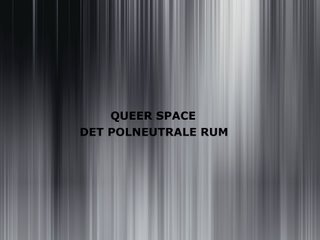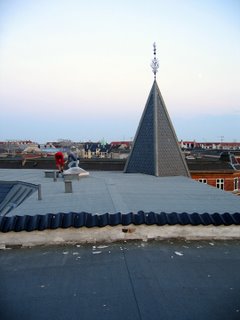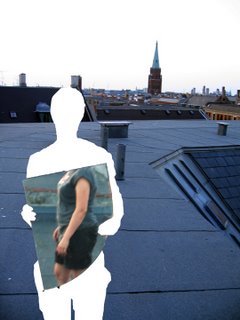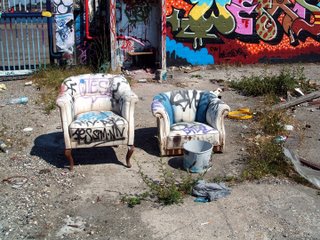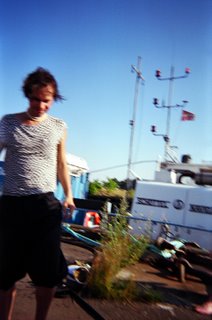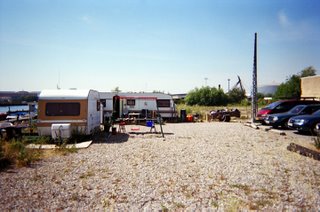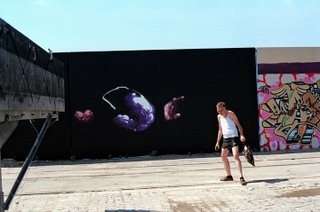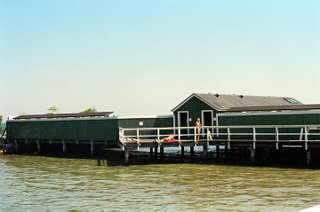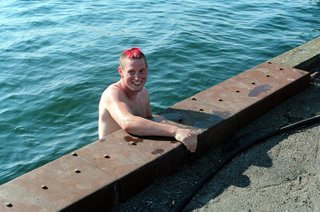Sunday, March 11, 2007
Image by Madam Fancy
Sunday, February 25, 2007
polariserede/polneutrale
Friday, July 28, 2006

Some recommended readings;
- Queer Space – Architecture and Same-Sex Desire by Aaron Betsky
- Txt, Space as a Key word by David Harvey
- Space of Hope by David Harvey
- The Production of Space by Henri Lefebvre
- Environmental Stoicism and Place Machismo by Michael Benedikt
- The history of sexuality by Michael Foucault
- That’s Revolting – Queer strategies for resisting assimilation edited by Mattilda, Aka Matt Bernstein Sycamore
- The trouble with normal by Michael Warner
- Ondt I Roeven by Mads Ted Drud-Jensen & Sune Prahl Knudsen
- Queer Sites – gay urban histories since 1600 by David Higgs
- Outside – Die politik queerer Raume by Matthias Haase and Marc Siegel
- Gay New York – Gender Urban Culture and the making of the gay male world by George Chauncey
- Stud – Architecture of Masculinity by Joel Sander
- Gender Trouble by Judith Butler

Friday, July 14, 2006
Queer Copenhagen

Liminal spaces:
A space is liminal when it is in a state of in-between-ness. The in-between-ness can happen as a place is abandoned and not immediately re-programmed. This kind of space contains a potential for alternative social practices and is in constant negotiation between the different practices performed in the space. The power structures in the liminal area have not been fixed, and are therefore potentially flexible and not bound between a binary opposition.
- Power plant area – H. C. Ørstedsværket
- Deserted train tracks by Mjölnerparken
- Refshaleøen
Sexualized places:
A place or a site for a number of specifically sexual practises. In popular terms a cruising spot. Cruising means moving in a space of decidedly sexual activity, searching for sexual action(s). The cruising spot is often a public place, like parks, parking lots, highway stops, public baths, public toilets etc. The sexual specificity of the place implies a lot of social coding, though the sexual activity – more or less visible - can appear alongside other social activities performed in the given space. The sexualized space isn’t per se a queer space, but as actions are often taken by the dominant power structure to control and preferably eliminate the sexual activities, the place can become a battleground.
- Amager fælled
- Central Station showers
- Fælledparken
- Utterslev mose
- Charlottenlund Bath Club
- Amager beach
- H. C. Ørstedspark
Counter political:
A counter political space is a highly powered space. The intention is to actively shift the power balance of the surrounding society. This space is, typically, in an oppositional relationship with the capitalized space of the cities in the western world. The counter political space has the potential to hold in it strong ideas of counter sexuality, as the notion of the sexual can be considered to be political.
- Ungdomshuset
- Christiania?
Poetic Plateaux:
Like a lot of the other space categories, the poetic plateaux contains a potential of otherness. It can be seen as an escape way from the spaces of the everyday life, and is potentially an open space where the conquering and defining of the space is not necessarily a struggle, but a personal action. The word poetic refers to that personal action of defining and redefining the space in accordance to whichever sensibility is present in that given moment.
- Rooftop
- Christiania community bath
Off(ice) territory:
Again a highly powered place. The notion of off refers to the fact that the reigning power deliberately wishes to control the uses of the space – even though it is a public space – and thereby wants to keep it an off-limits-space.
- Kalvebod brygge
- Banking area on Christianshavn
Super powered spaces:
Like the Off(ice) territory, the super powered space is controlled deliberately to keep certain actions away. There are different ways of controlling a space – which is done all the time, almost every where – and the results are more or less visible. But a super powering of the space doesn’t have to be visible, but can also be for example auditive.
- Central Station entrance/exit with classical music

Liminal spaces:
A space is liminal when it is in a state of in-between-ness. The in-between-ness can happen as a place is abandoned and not immediately re-programmed. This kind of space contains a potential for alternative social practices and is in constant negotiation between the different practices performed in the space. The power structures in the liminal area have not been fixed, and are therefore potentially flexible and not bound between a binary opposition.
- Power plant area – H. C. Ørstedsværket
- Deserted train tracks by Mjölnerparken
- Refshaleøen
Sexualized places:
A place or a site for a number of specifically sexual practises. In popular terms a cruising spot. Cruising means moving in a space of decidedly sexual activity, searching for sexual action(s). The cruising spot is often a public place, like parks, parking lots, highway stops, public baths, public toilets etc. The sexual specificity of the place implies a lot of social coding, though the sexual activity – more or less visible - can appear alongside other social activities performed in the given space. The sexualized space isn’t per se a queer space, but as actions are often taken by the dominant power structure to control and preferably eliminate the sexual activities, the place can become a battleground.
- Amager fælled
- Central Station showers
- Fælledparken
- Utterslev mose
- Charlottenlund Bath Club
- Amager beach
- H. C. Ørstedspark
Counter political:
A counter political space is a highly powered space. The intention is to actively shift the power balance of the surrounding society. This space is, typically, in an oppositional relationship with the capitalized space of the cities in the western world. The counter political space has the potential to hold in it strong ideas of counter sexuality, as the notion of the sexual can be considered to be political.
- Ungdomshuset
- Christiania?
Poetic Plateaux:
Like a lot of the other space categories, the poetic plateaux contains a potential of otherness. It can be seen as an escape way from the spaces of the everyday life, and is potentially an open space where the conquering and defining of the space is not necessarily a struggle, but a personal action. The word poetic refers to that personal action of defining and redefining the space in accordance to whichever sensibility is present in that given moment.
- Rooftop
- Christiania community bath
Off(ice) territory:
Again a highly powered place. The notion of off refers to the fact that the reigning power deliberately wishes to control the uses of the space – even though it is a public space – and thereby wants to keep it an off-limits-space.
- Kalvebod brygge
- Banking area on Christianshavn
Super powered spaces:
Like the Off(ice) territory, the super powered space is controlled deliberately to keep certain actions away. There are different ways of controlling a space – which is done all the time, almost every where – and the results are more or less visible. But a super powering of the space doesn’t have to be visible, but can also be for example auditive.
- Central Station entrance/exit with classical music
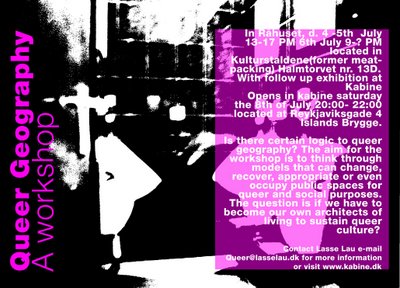
Queer Geografi
(Scroll down for English version)
En workshop organiseret af APR - Agentur for Offentlige Ressourcer
i Råhuset, d. 4 -5 juli 13:00- 17:00, 6 juli 21:00-?
beliggende i Kulturstaldene Halmtorvet nr. 13 D.
Efterfølgende udstilling og fernisering i Kabine
Åbning lørdag d. 8 juli 20:00- 22:00
Reykjaviksgade 4, Islands Brygge.
Eksisterer der en bestemt logik for ”Queer Geografi?” Workshoppens
formål er at remodelere det offentlige rum, og at se på muligheden for at genetablere og ændre steder eller ligefrem besætte områder i byrummet til bestemte former for QUEER formål.
Traditionelt set har Queer rum ofte eksisteret i magtesløse
strukturer, parallelt med gader, skulpturer, parker,
offentlige toiletter, strande m.m. Det er disse fysiske rum der
rummer muligheden for indskrivelsen af en særlig social og geografisk Queer logik.
Workshoppen vil undersøge disse oaser og deres unikke karakter, samt de forskellige forbrugs cirkulationer der ligger mellem kønnene. Det kan iagttages bl.a. gennem samfundets hegemoniske struktur, der de seneste år har forudsagt en social (fra)filtrering af Queer formationer i det offentlige rum. Dette sammenstød af rumlige konflikter, skriver David Harvey, skyldes mødet mellem mikro skalaen, mellem kroppen og det personlige, sat op mod makro skalaen, de globale politiske og økonomiske interesser.
Spørgsmålet er: om ønsket om at opretholde en Queer kultur derfor fordrer at vi i fremtiden bliver vores egne arkitekter?
Praktisk vil workshoppen starte ud med at forsøge fælles at kortlægge
Queer København. Workshoppens vil således finde nye hemmelige strategier for måder at tænke og formulere Queer rum. Workshoppen vil være en mulighed for socialt at diskutere og praktisk forsøge nye former for auto-organiserede metoder at indskrive Queer erfaringer i byrummet. Vi vil tage ud I marken og registrere det eksisterende byrum og udveksle personlige erfaringer, intervenere, samt diskutere de historiske betydninger eksistensen af mod-offentlige rum har haft.
Resultatet af den kollektive proces vil dokumenteres og vises med en
lille fælles udstilling i Kabine. Kabine er et lille progressivt
kunstnerstyret udstillings rum som ligger på Islands Brygge. Desuden
er der mulighed for at up-loade vores materiale fra workshoppen gennem T-vlog, og dele processen og resultatet via Internettet sendt direkte på Tv-Tv.
Tider for workshop i Råhuset: 4. juli kl. 13-17
5. juli kl. 13-17
6. juli kl. 21-?
Fernisering 8. juli kl. 20-22
Udstilling Åben i Kabine: 9-15. juli kl. 14-17
Kontakt Lasse Lau email Queer@lasselau.dk for mere information
eller besøg www.kabine.dk
Queer Geography
(English version)
Workshop organized by APR- Agency for Public Resources
in Råhuset, d. 4 -5th July 13-17 PM 6th July 9-? PM
located in Kulturstaldene (meatpacking district) Halmtorvet nr. 13 D.
With following exhibition at Kabine which
Opens Saturday the 8th of July 20:00- 22:00 located at Reykjaviksgade 4, Islands Brygge.
Is there certain logic to queer geography? The aim for the workshop is to think through models that can change, recover, appropriate or even occupy public spaces for queer and social purposes. The Queer space is often seen as a powerless structure, that exist parallel to streets, sculptures, parks, public toilets, beaches, etc. and time-to-time gets appropriated socially into the roam of queer meaning. This workshop wants to examine these so-called “queer oases,” and their special significance, and look into the role of gender relations by the different circulation of inhabitation. The hegemony of social structures in society has frequently resulted in the filtering of social uses in the public space. This clash between perceptions of space, David Harvey writes, happens between the micro-scale of the body and the personal and the macro-scale of the global political economy. The question is if we have to become our own architects of living to sustain queer culture?
The workshop will take place as a laboratory finding new secret ways of thinking and formulating of queer experiences into the public space. We will make field trips, and talk about individual experiences, and the inherited social and historical spaces that was importance for the formation of a counter-public. We will start out by collectively map; Queer Copenhagen based on the social exchange of knowledge between the participants; visits some of those desired locations; and recover and re-inscribe new and auto-organized -ways through interventions of engaging the city.
The outcome of this process is to be collectively documented and shown at Kabine, which is a small progressive artist space located on Islands Brygge, and further publicizing is individually available through T-vlog a do it your self Television program, where you can upload from your own web based computer to broadcast direct on the local Station Tv-Tv.
Workshop schedule in Råhuset: 4th of July 1-5 PM
5th of July 1-5 PM
6th of July 9-? PM
Opening 8th of July 8-10PM
Exhibition opening times: 9-15 of July 2-5 PM
Please contact Lasse Lau on email queer@lasselau.dk for more information, or visit the website www.kabine.dk


